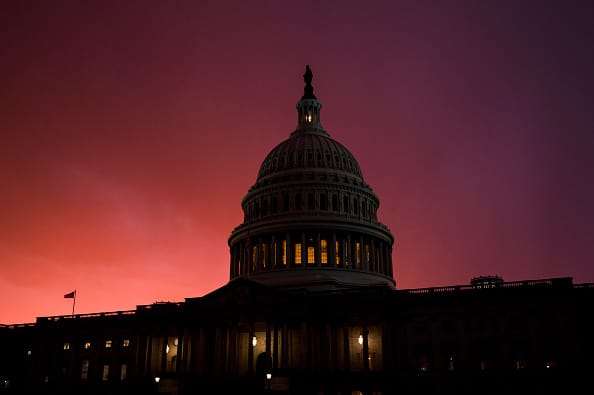
Bill Clark | CQ-Roll Call, Inc. | Getty Images
The Covid relief bill released Monday by a bipartisan group of senators has many helpful — if temporary — provisions for unemployed workers, according to experts.
The relief package — which, if passed, would be the first since the CARES Act in early spring — extends expiring aid programs and increase weekly benefits by $300.
Among other significant measures, the bill would let states waive a requirement that self-employed, freelancers, gig workers and contractors repay benefits in certain situations.
More from Personal Finance:
Extra unemployment benefits may be delayed for weeks
Second $1,200 stimulus checks are not in the new $908 billion relief proposal
Ponzi schemes, other investment fraud on rise during pandemic
It would also amend rules so workers laid off in the early days of the pandemic wouldn’t lose aid or see their benefits reduced after a year.
“[The bill] takes care of those who are unemployed,” Sen. Joe Manchin, D-W.V., and one of the lawmakers involved in negotiations, said during a press conference Monday.
There are roughly 19 million Americans collecting unemployment benefits, according to the Labor Department.
Here are some of the unemployment measures in the Bipartisan COVID-19 Emergency Relief Act of 2020.
Sen. Joe Manchin, D-W.V., speaks alongside a bipartisan group of Democrat and Republican members of Congress as they announce a proposal for a Covid-19 relief bill on Capitol Hill on Dec. 14, 2020 in Washington. Lawmakers from both chambers released a $908 billion package Monday, split into two bills.
Tasos Katopodis | Getty Images News | Getty Images
$300 a week
The legislation would pay an extra $300 a week to all workers receiving unemployment benefits.
It would be available for four months, for periods of unemployment falling between Dec. 26 and April 19.
With that weekly supplement, the average recipient of state benefits would get about $620 a week, according to Labor Department data.
Undoubtedly … we may have to do more.
Sen. Susan Collins
R-Maine
The proposed enhancement is like other federal subsidies offered earlier in the pandemic.
The CARES Act offered a $600 weekly boost from the early spring through the end of July. President Donald Trump then created a Lost Wages Assistance program, which paid $300 a week, starting in August, for up to six weeks. That assistance, however, wasn’t available to hundreds of thousands of workers due to eligibility restrictions.
Extra weeks
The legislation would give an extra four months of jobless aid to workers collecting benefits through the Pandemic Unemployment Assistance or Pandemic Emergency Unemployment Compensation programs.
PUA is available to self-employed, gig, freelance and other workers ineligible for traditional state benefits. PEUC prolongs state benefits by an extra 13 weeks.
These programs, which collectively support 13 million people, are scheduled to end the last weekend in December.
“Continuing benefits and adding $300 on top will make a big difference for a lot of people,” said Andrew Stettner, a senior fellow at the Century Foundation. “[Though] we may not be out of this in 16 weeks,” he cautioned.
PUA overpayments
Many PUA recipients got paid in error during the Covid recession, some due to inadvertent mistakes on initial benefit applications, according to unemployment experts.
Many workers owe back thousands or tens of thousands of dollars — which may have long since been spent — because states sometimes discovered errors after issuing months of payments, experts said. States can garnish future benefit payments, tax returns or wages to recoup money, they said.
Normally, states can waive such overpayments, as is the case with traditional state benefits. But the CARES Act didn’t allow for such a release valve with the PUA program.
“The PUA overpayment problem is about the explode,” said Michele Evermore, a senior policy analyst at the National Employment Law Project.
The bipartisan legislation would allow states to waive PUA overpayments in cases when they were issued through no fault of an individual.
“In other words, the agency says, ‘If you made a mistake, you wouldn’t have to pay that overpayment back,'” Stettner explained.
It would also allow states to waive re-payment when “contrary to equity and good conscience,” per the bill text — meaning people wouldn’t have to repay if doing so would cause extreme financial hardship, according to Stettner.
These remedies are similar to those states provide for traditional benefit programs.
A year of benefits
Many workers who became unemployed in the early days of the Covid pandemic are fast approaching a year of joblessness.
States generally re-calculate workers’ benefits after this year-long milestone — and, for most, that would mean a severely reduced weekly benefit. Some could be deemed ineligible for benefits altogether.
That’s because states calculate benefits based on work history roughly occurring over the past year to year and a half. Those who haven’t found new jobs, or have worked few hours, in recent months wouldn’t have a rich work history.
The bipartisan legislation would allow people to keep their current level of benefits beyond a year, for those whose re-calculated benefit would be at least $25 less.
“Otherwise, we’d have a big catastrophe in March,” Evermore said.
This extension would be available until April 19.
“Undoubtedly … we may have to do more,” said Sen. Susan Collins, R-Maine, another of the bill’s architects, said of the legislation on Monday. “Let’s not go home for Christmas without passing this much-needed relief for the American people.”


